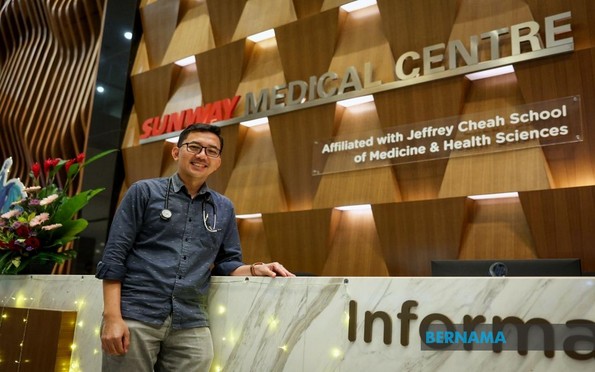Endoscopy Helps Examine Abdominal Pain, Identify Conditions in Children
14 December 2023

PETALING JAYA - Endoscopy is a nonsurgical procedure that allows a doctor to visually examine the inside of the body with an endoscope - a long, thin and flexible tube with a camera and light.
Sunway Medical Centre, Sunway City consultant paediatrician Dr Nazrul Neezam Nordin said in children, endoscopy could be used to look for causes of unexplained, recurrent and persistent abdominal pain as well as to identify certain conditions.
Whilst undergoing any type of medical procedure could be stressful for any child, he said endoscopy is a relatively quick and painless procedure as it is done under adequate sedation.
“There are two types of endoscopy for children which are the upper endoscopy or referred to as a gastroscopy and the lower gastrointestinal endoscopy known as colonoscopy,” he told Bernama in an exclusive interview recently.
 Dr Nazrul Neezam, who is also a paediatric gastroenterologist and hepatologist, further explained that in the upper endoscopy or gastroscopy procedure, gastroenterologists would insert the endoscope from the mouth into the digestive tract to examine the upper intestine of the patients.
Dr Nazrul Neezam, who is also a paediatric gastroenterologist and hepatologist, further explained that in the upper endoscopy or gastroscopy procedure, gastroenterologists would insert the endoscope from the mouth into the digestive tract to examine the upper intestine of the patients.
He said the procedure would be performed if the child experienced persistent symptoms of unexplained vomiting, recurrent vomiting episodes or vomiting that is associated with warning symptoms such as blood-stained vomit.
“For gastroscopy, it is a very simple procedure where the child needs to fast for at least six hours before the procedure. Normally, this procedure only takes five to 10 minutes depending on the case. It would take longer sometimes, but on average it is between five to 10 minutes,” he added.
On the other hand, Dr Nazrul Neezam said the colonoscopy procedure involved the examination of the colon or large intestine, where the endoscope or colonoscope, specifically is inserted from the anus.
He said the procedure would investigate symptoms related to abdominal pain that is significant and severe enough to affect daily activities. It is also indicated if the abdominal pain is associated with prolonged diarrhoea, especially with the presence of weight loss.
“Prior to colonoscopy, children usually will be admitted for bowel preparation. It involves administering medication to make them poop. This is essential to ensure a clean colon to enable a safe procedure and proper assessment of the bowel surface being done.
“Colonoscopy takes a longer time as it is technically more challenging compared to gastroscopy. A typical procedure takes between 15 minutes to 45 minutes,” Dr Nazrul Neezam said.
Besides that, he shared that there is no dietary restriction after the procedure, but generally, patients could start with taking fluid first and upgrade accordingly because in some cases, the effect of the anaesthetics will linger but it all depends from case to case.
Despite all that, he said parents need to be alert on specific signs after the procedure, especially severe abdominal pain with distension as a result of the extremely unlikely risk of bowel perforation.
“Slight abdominal distension or bloating is expected as the intestine is inflated with air during the procedure," he added.
Commenting on the risk of the procedure, Dr Nazrul Neezam who has 12 years of experience said it is highly uncommon.
Source: BERNAMA
Back




